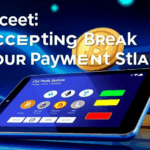AdSense Bitcoin Payments and the Glorious Abyss of Logic Gaps
So What Happens If You Try to Get Paid in Bitcoin?
Short answer: nothing. That feature doesn’t exist. But that hasn’t stopped about a dozen clients over the years from asking me why their AdSense balance couldn’t just go “straight to crypto.” One even swore they saw it in a dropdown once (they didn’t). As of now, Google AdSense doesn’t support crypto payouts — no Bitcoin, no stablecoins, nothing.
And here’s the kicker: there’s been no public comment on this from AdSense itself. Not even a canned refusal. You’ll find threads floating around Reddit and a graveyard of unanswered support forum posts, but that’s it.
The closest thing to official policy is buried in the payment methods section of your dashboard: wire transfers, checks, Western Union (once?), and EFT — but all fiat. If anyone tries to tell you there’s a secret setting via the Google Payments profile, don’t listen. That rabbit hole ends in an account flag, not a wallet address.
Why Payout via Bitcoin Isn’t Just a Checkbox Somewhere
The main issue here revolves around how AdSense structures its accounting — namely, in fiat-based workflows per region. Each country’s payout happens through a region-locked processor that complies with local KYC/AML laws. Introducing Bitcoin as an option breaks that authority chain unless Google takes on the added role of crypto payment processor, escrow handler, and regulatory conduit. They won’t.
The real problem is less technical and more… institutional. When I dug into some API response payloads from AdSense backend calls (via browser dev tools and a deeply unhealthy obsession with xhr overfetch), I found no strings or enum values even hinting at crypto currency formats. Every monetary type resolves against predeclared ISO currency codes — USD, EUR, BRL, etc. Nothing dynamic.
{
"currency": "USD",
"payoutMethod": "EFT",
"country": "US",
"complianceStatus": "VALID"
}
No hooks, no funny business. If they’re planning Bitcoin support, it’s not even halfway baked.
Okay, But Can You Convert It Yourself?
You can. But it’s messier than it sounds.
- Set up AdSense payouts to a bank account that interfaces well with crypto platforms (Revolut or certain fintech banks might work… until they freeze your account for “unusual login behavior”).
- Use a licensed exchange like Coinbase to auto-convert bank deposits into Bitcoin — but watch those conversion fees. They’re basically convenience fees with a machete.
- If you’re outside the US, your local exchange might not even support automatic conversion, meaning you’ll have to do manual transfers (and time them around gas fees).
- Legal implications vary. I got an email once where the subject line was literally “RE: crypto as taxable income?? help??”
- And don’t forget: if your AdSense account is under a business name, and your exchange wallet is personal, that flow might trigger a mismatch flag somewhere.
The overhead isn’t technical, it’s bureaucratic. You’re fighting system design philosophy with duct tape and automation scripts. Which… sure, is how a lot of us live. But expect your accountant to send you a PDF full of legalese and quiet judgment.
Do Third-Party Ad Networks Let You Do This?
Some do. Notably, there are a couple lesser-known ad networks — mostly ones that cater to crypto content — that do offer payouts in Bitcoin. The payout thresholds are often higher, and you’ll end up with far lower CPMs than AdSense unless you’re in a niche that overlaps with crypto finance.
I tested one on a side blog about validating BRC-20 indexers. The payout arrived in BTC, sure… ten days late. And not before I had to verify my identity with a selfie holding a passport and a utility bill in the same photo. They did pay, though. So I won’t name-shame.
The broader issue is that Google’s reach and reliability just doesn’t exist in those ecosystems. So switching to a crypto-payout-native network is trading payout convenience for reach and CPM consistency.
Payoneer, Wise, and the Dead-End of Conversion Layers
You might think services like Payoneer or Wise could intermediate the fiat-to-crypto bit. They can’t. Or rather, they won’t. I tried routing a client’s AdSense payout through Wise, with the plan being to instantly sweep the incoming deposit into a crypto exchange’s funding account. It failed. Wise flagged the transfer, and shut down that receiving sub-account a few days later. “Activity inconsistent with our platform usage policy.”
Payoneer was more subtle. It just refused to forward the funds unless the recipient account matched the name exactly and wasn’t flagged by their compliance AI — which apparently thinks anything with “wallet” in the name is money laundering.
At this point I realized: not only is there no official bridge between AdSense and crypto, but attempts to soft-hack one with financial middlemen usually end in systems that choose denial over clarity. There’s no modal saying “This is not allowed by Google policy.” It just fails silently, or worse, terminates accounts.
What Actually Shows Up in the Google Payments API
Someone asked me if you could modify the currency using local overrides or even just pass custom currency keys using browser Dev Tools on the Payment Settings page. You can’t. I tried. Session-modified JavaScript won’t persist, and even if you force a submit event with a spoofed currency code, the backend validation explodes with a vaguely threatening error.
“Unsupported currency code: BTC”
which I swear wasn’t even styled properly — the margin was off, like it came from an internal debug panel no user is supposed to see. That’s when I realized: deep down, someone might have tested this internally at Google and just—left the flag in, unconnected, but not removed. Glorious.
The One Place Bitcoin Does Actually Show Up: Google Play
Totally unrelated to AdSense, but while digging into past Google crypto strategy stumbles (you remember the whole ban-then-allow-crypto-ads debacle), I landed in the Google Play merchant docs. Turns out you can offer in-app items that are priced in local currency but funded through crypto if you go through a third-party processor.
This is not useful for AdSense, but it tells you Google is at least aware of how crypto fits into monetized product flow. They just haven’t plugged it into any of their ad revenue ecosystems. Whether that’s by design or legal paralysis, hard to say. But it means there’s precedent for Google working with crypto-related payments — just never for paying you, only for letting you charge others.
A Nasty Side Effect Nobody Talks About: Refund Flags
Here’s one side effect I incurred trying to route payouts into a wallet-convertible account: AdSense flagged the routing as suspicious, and the associated bank rejected the incoming transaction. That triggered a refund on Google’s side. But the system treats a failed payout as potential fraud, which means they pause all payouts on your profile until manual review.
It took five business days, two phone calls, a billing profile reset, and a “callback queue” email thread where nobody knew what a cryptocurrency wallet was. One support rep genuinely thought I was trying to redeem a gift card. So if you’re messing with routing to eventually end up in crypto, make extra sure the initial receiving account behaves like a completely normal bank account as far as AdSense can tell. Even one bounce can throw off your whole fiscal quarter.
Discovery: The Log Entry That Explains Nothing Yet Solves Everything
This happened once and never again, but I found an edge behavior hidden in plain sight.
{
"payment_purpose": "publisher_earnings",
"funding_path": "google_wallet",
"routing_vector": "int_digital_transfer"
}
I was inspecting the JSON returned for a payment timeline object, and saw that weird routing_vector value. It normally shows up as sepa_transfer or ach_direct. “int_digital_transfer” popped only once — during a payout via Google Wallet (non-Adsense — it was a test merchant account).
If AdSense ever experiments internally (or regionally) with non-fiat routing, this is probably the traceable field we’d watch. Not one document anywhere references this. That said, it’s very likely sandbox-only behavior — or a relic from a deprecated prototype. But useful to keep in the back of your head next time you think you found a secret toggle.














